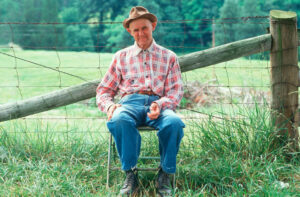Joy Division is the depressingly appropriate house band for America’s 2024 election, and “Love Will Tear Us Apart” its soundtrack.
A generation ago, party affiliation played almost no role in American relationships. Today, only half of Republicans and one-third of Democrats report having a friend from the opposite party. What is true for platonic relations is even clear in love. In the Fifties, 10% of Americans expressed a partisan preference for their daughter’s spouse. That figure has since climbed to 60%. Parents need not be concerned: only 4% of marriages are now between a Republican and a Democrat.
No longer friends or partners, liberals and conservatives instead eye one another warily. Nearly three of every four Republicans, and two-thirds of all Democrats, regard their political opposites as “immoral”.
Jody Carlucci is not surprised. The 51-year-old Trump supporter refuses to put a GOP sticker on her Jeep Rubicon out of fear that someone would “throw a brick” at it. She’s surely right to be afraid: making her home in Erie, Pennsylvania, Carlucci lives in 2024 election’s political ground zero.
Even amateur psephologists understand that as Erie goes, so goes Pennsylvania — and as the Keystone State goes, the nation goes too. Ethan Kibbe, a local reporter, puts it well: “Candidates learn quickly that they can’t win Pennsylvania without Erie County. If you want to appeal to the average Pennsylvanian, you have to appeal to the average Erieite.”
The bellwether county of the bellwether state, Erie has voted for the winner in statewide races 23 of 25 times since 2008. In presidential races, meanwhile, the county has voted for the winner in all-but-one presidential race since the Second World War.
In practice, then, Erie is America’s political no man’s land, as bitter and contested as anywhere in the republic. I should know. I live in Erie, and over the past four years have watched my lakeside home tear itself apart.
In 2020, the Ku Klux Klan left flyers on the lawns of Erieites with Biden signs. On election day, armed poll-watchers patrolled the neighbourhoods. Now, these tensions have returned. Joyce Mallet, an 81-year-old Erie resident, has a Trump sign in her yard. Passersby regularly give her the middle finger. Mallet’s husband seems unconcerned: “She gives it right back to them.” Yet if Mallet can handle it, this greying Rust Belt town remains the place in America where, borrowing Lincoln, the bonds of our affection are closest to breaking.
Of course, I have my own opinions here. The Trump phenomenon has always left me gobsmacked, and a second Trump term would ravage both Nato and my sanity. But if I can’t control who wins in November, what I can at least do is try and understand that other half of Erie that disagrees with me.
Legacy journalists regularly don Safari hats and venture into Red America to categorise “The Five Types of Trump Voters”. But in Erie, I found that the 74 million Americans who last voted for Trump can’t be characterised, and instead run the gamut of class and education and race.
Before 2016, Carlucci was so apolitical she’d never voted before. As the self-described political cynic put it: “Why would I trust a politician, especially when they are all talking like the teachers, ‘wah, wah, wah,’ from the Peanuts cartoon?” In 2016, though, she finally registered to vote, believing it was time for a change. “Trump was different,” she says. “It was interesting to see a businessman. He says the things they all say. But it was how he said it.”
Carlucci isn’t alone. For just as she revels in Trump’s pugilistic style, others agree. “Trump does go off on tangents. But they [his supporters] like this because he is unpredictable,” explains one journalist, who came to Erie to cover a Trump rally for a MAGA-friendly news site. “They like it that he jabs back and does the name-calling. They see it as an instinctual sign of strength. There is a real person under the blue suit and red tie.”
For a generation, authenticity and tangible results have been missing ingredients in American politics. “I’m frustrated with electoral politics that are not responsive to the American people,” says Eva Posner, a liberal political strategist. “The Democratic Party should know better and do better. If you talk to most Democratic officials, they care. But the lack of political courage is astounding.”
Certainly, Trump has made strange political hay out of this mistrust. Fewer than a third of Pennsylvania voters deem him a person of “strong moral character”. Yet polls also reveal that a majority of Republicans, like Carlucci, interpret his crassness as “tells-it-like-it-is” honesty. And this has real world consequences both in Erie and across the Commonwealth. Today, Pennsylvania Republicans now trust Trump more than the traditional media.
Beyond poking a pudgy finger into the liberal establishment’s eye, though, people like Carlucci also seem to admire Trump for his economic achievements — or anyway what she perceives as the failings of his successors.
A single mom who works as an administrative assistant at a local university, she plans to vote with her wallet. “I couldn’t rob Peter to pay Paul,” she says, “because Peter is broke too.”
For similar reasons, Carlucci looks back to the Trump years with nostalgia. Spiralling rent and grocery prices means she struggles in a way she didn’t four years ago. This year, a relative paid her 11-year-old son’s Catholic school tuition. “Those four years under Trump my life was better, and I felt safe,” she says. “When you work at a great job you shouldn’t have to have a second or third job. That’s not fair to my kid.”
Her memory isn’t faulty. Before Covid, the Trump economy featured steady 2.5% economic growth, low 1.9% inflation, a robust 2.1% spike in real wages, and the lowest unemployment rate since the mid-Sixties. Bookended by the Great Recession and post-pandemic inflation, the Trump years in hindsight feel remarkably prosperous, especially for the working and lower-middle classes hit hardest by price jumps.
As Posner adds, that explains a key reason for Trump’s enduring popularity. He may lie as easily as most people breathe, but for voters like Carlucci, his presidency improved their lives in tangible ways. “He is pompous and arrogant,” she concedes. “But he accomplished what he set out to accomplish.”
Perhaps. But in a town as divided as Erie, you have to be careful. In Carlucci’s neighbourhood, where Trump signs are common, partisans roll down their windows and hurl abuse from their cars. Carlucci rolls her eyes. “You aren’t changing anyone’s mind acting like that.” Yet out of caution, she’s advised her 74-year-old mother against putting out a political sign herself.
At work, meanwhile, Carlucci keeps her politics quiet. The same cannot be said of others. Professors regularly waltz into her office to cuss and gripe about the former president. Wholly unaware that others may see the world differently, they force her, and a furtive set of MAGA fellow travellers, onto a secret Microsoft Teams chat. At church, my 81-year-old mom has the opposite experience. A Mississippi native and life-long Republican, she nonetheless dismisses Trump as “gross”. Yet she dares not share her true views and upset the congregation.
Not everyone in Erie is quite so diffident. Consider Doug King. A Shakespeare scholar and English professor at Gannon University, a youthful conversion to Catholicism prodded him toward an inchoate conservatism, dovetailed by profound pro-life principles.
These days, King dismisses most Republicans as “idiots.” But he rejects the Democrats too, disgusted by their support for abortion and foreign adventures like the Iraq War. “When we poke our nose into others’ affairs,” he says, “you need a clear mission of when you get in or get out.”
A funky-dressing sometime actor and musician, who works in liberal academia, King freely agrees that he doesn’t fit the MAGA stereotypes. When his fellow professors discover he supports Trump “their jaws drop”.
Like Carlucci, meanwhile, King is far from insensible to Trump’s flaws. “He is not pro-life,” he concedes, but he will “do less harm”. As someone who has always run against the grain — before entering academia, he spent his 20s following the Maharishi Yogi — King is another Erieite drawn to Trump’s counter-cultural status. “I tend,” he says, “to root for the underdog.”
Here, the professor shares much with Tecumseh Brown-Eagle. An Erie native and Trump enthusiast, the 67-year-old accountant was born to a black family but changed his name to reflect his Native American ancestry. “It is definitely the underdog thing,” stresses Brown-Eagle, a former Democrat, of the real estate baron. “He is an underdog for a stupid reason: he is successful.”
Like King, Brown-Eagle is a searcher. A Muslim convert who studied Judaism, he travelled the world as a member of the US karate team. Seeing a kindred spirit in Trump, he calls him a “black sheep” who has the courage to say what everyone else is thinking. “They are on his ass so hard,” he says. “He can’t be a fake dude. We feel that he is being bullied.”
King makes a similar point. “He’s this bull in the China shop. It’s not that Fox News loves him, or Republicans love him. It is that the establishment hates him.”
That seems to be enough for this trio of Erie voters. But politics also has its limits. Whatever the signs she sticks in her front yard, Carlucci equally notes that she and her “very Democratic” mother have decided not to have political discussions at home. “It is stupid,” she laughs, “to not talk to one another over two people we have never met.” It seems Joy Division’s mantra does have limits after all.
Disclaimer
Some of the posts we share are controversial and we do not necessarily agree with them in the whole extend. Sometimes we agree with the content or part of it but we do not agree with the narration or language. Nevertheless we find them somehow interesting, valuable and/or informative or we share them, because we strongly believe in freedom of speech, free press and journalism. We strongly encourage you to have a critical approach to all the content, do your own research and analysis to build your own opinion.
We would be glad to have your feedback.
Source: UnHerd Read the original article here: https://unherd.com/



